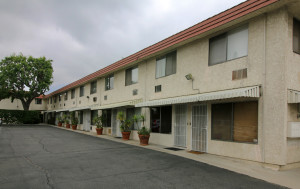(Unlawful Detainer Lawsuit)
Overview of the eviction process
If the tenant doesn’t voluntarily move out after the landlord has properly given the required notice to the tenant, the landlord can evict the tenant. In order to evict the tenant, the landlord must file an unlawful detainer lawsuit in superior court.
In an eviction lawsuit, the landlord is called the “plaintiff” and the tenant is called the “defendant.”
Recent laws designed to abate drug dealing 295 and unlawful use, manufacture, or possession of weapons and ammunition,296 permit a city attorney or prosecutor in selected jurisdictions 297 to file an unlawful detainer action against a tenant based on an arrest report (or other action or report by law enforcement or regulatory agencies) if the landlord fails to evict the tenant after 30 days notice from the city. The tenant must be notified of the nature of the action and possible defenses.
An unlawful detainer lawsuit is a “summary” court procedure. This means that the court action moves forward very quickly, and that the time given the tenant to respond during the lawsuit is very short. For example, in most cases, the tenant has only five days to file a written response to the lawsuit after being served with a copy of the landlord’s summons and complaint.298 Normally, a judge will hear and decide the case within 20 days after the tenant or the landlord files a request to set the case for trial.299
The court-administered eviction process assures the tenant of the right to a court hearing if the tenant believes that the landlord has no right to evict the tenant. The landlord must use this court process to evict the tenant; the landlord cannot use self-help measures to force the tenant to move. For example, the landlord cannot physically remove or lock out the tenant, cut off utilities such as water or electricity, remove outside windows or doors, or seize (take) the tenant’s belongings in order to carry out the eviction. The landlord must use the court procedures.
If the landlord uses unlawful methods to evict a tenant, the landlord may be subject to liability for the tenant’s damages, as well as penalties of up to $100 per day for the time that the landlord used the unlawful methods.300
In an unlawful detainer lawsuit, the court holds a hearing at which the parties can present their evidence and explain their case. If the court finds that the tenant has a good defense, the court will not evict the tenant. If the court decides in favor of the tenant, the tenant will not have to move, and the landlord may be ordered to pay court costs (for example, the tenant’s filing fees). The landlord also may have to pay the tenant’s attorney’s fees, if the rental agreement contains an attorney’s fee clause and if the tenant was represented by an attorney.301
If the court decides in favor of the landlord, the court will issue a writ of possession.302 The writ of possession orders the sheriff to remove the tenant from the rental unit, but gives the tenant five days from the date that the writ is served to leave voluntarily. If the tenant does not leave by the end of the fifth day, the writ of possession authorizes the sheriff to physically remove and lock the tenant out, and seize (take) the tenant’s belongings that have been left in the rental unit. The landlord is not entitled to possession of the rental unit until after the sheriff has removed the tenant.
The court also may award the landlord any unpaid rent if the eviction is based on the tenant’s failure to pay rent. The court also may award the landlord damages, court costs, and attorney’s fees (if the rental agreement or lease contains an attorney’s fee clause and if the landlord was represented by an attorney). If the court finds that the tenant acted maliciously in not giving up the rental unit, the court also may award the landlord up to $600 as a penalty.303 The judgment against the tenant will be reported on the tenant’s credit report for seven years.304
How to respond to an unlawful detainer lawsuit
If you are served with an unlawful detainer complaint, you should get legal advice or assistance immediately. Tenant organizations, tenant-landlord programs, housing clinics, legal aid organizations, or private attorneys can provide you with advice, and assistance if you need it. (See “Getting Help From a Third Party “)
You usually have only five days to respond in writing to the landlord’s complaint. You must respond during this time by filing the correct legal document with the Clerk of Court in which the lawsuit was filed. If the fifth day falls on a weekend or holiday, you can file your written response on the following Monday or nonholiday.305 Typically, a tenant responds to a landlord’s complaint by filing a written “answer.” (You can get a copy of a form to use for filing an answer from the Clerk of Court’s office or online at www.courts.ca.gov/documents/ud105.pdf.
You may have a legal defense to the landlord’s complaint. If so, you must state the defense in a written answer and file your written answer with the Clerk of Court by the end of the fifth day. Otherwise, you will lose any defenses that you may have. Some typical defenses that a tenant might have are listed here as examples:
- The landlord’s three-day notice requested more rent than was actually due.
- The rental unit violated the implied warranty of habitability.
- The landlord filed the eviction action in retaliation for the tenant exercising a tenant right or because the tenant complained to the building inspector about the condition of the rental unit.
Depending on the facts of your case, there are other legal responses to the landlord’s complaint that you might file instead of an answer. For example, if you believe that your landlord did not properly serve the summons and the complaint, you might file a Motion to Quash Service of Summons. If you believe that the complaint has some technical defect or does not properly allege the landlord’s right to evict you, you might file a Demurrer. It is important that you obtain advice from a lawyer before you attempt to use these procedures.
If you don’t file a written response to the landlord’s complaint by the end of the fifth day, the court will enter a default judgment in favor of the landlord. A default judgment allows the landlord to obtain a writ of possession (see Writ of Possession), and may also award the landlord unpaid rent, damages and court costs.
The Clerk of Court will ask you to pay a filing fee when you file your written response. The filing fee typically is about $180. However, if you can’t afford to pay the filing fee, you can request that the Clerk allow you to file your response without paying the fee (that is, you can request a waiver of the fee). An application form for a fee waiver, called an “Application for Waiver of Court Fees and Costs,”can be obtained from the Clerk of Court or online at http://www.courts.ca.gov/documents/fw001.pdf.306
After you have filed your written answer to the landlord’s complaint, the Clerk of Court will mail to both you and the landlord a notice of the time and place of the trial. If you don’t appear in court, a default judgment will be entered against you.
Special Rules for Tenants in the Military: A servicemember may be entitled to a stay (delay) of an eviction action for 90 days. This rule applies to the servicemember and his or her dependents (such as a spouse or child) in a residential rental unit with rent of $2,400 per month or less, as adjusted by the housing price inflation adjustment. The servicemember’s ability to pay rent must be materially affected by military service. The judge may order the stay on his or her own motion or upon request by the servicemember or a representative. The judge can adjust the length and terms of the delay as equity (fairness) requires.307 Landlords that violate the court-ordered eviction process in regards to a servicemember may face a fine and/or imprisonment for up to one year.307.1
Eviction of “unnamed occupants”
Sometimes, people who are not parties to the rental agreement or lease move into the rental unit with the tenant or after the tenant leaves, but before the unlawful detainer lawsuit is filed. When a landlord thinks that these “occupants” might claim a legal right to possess the rental unit, the landlord may seek to include them as defendants in the eviction action, even if the landlord doesn’t know who they are. In this case, the landlord will tell the process server to serve the occupants with a Prejudgment Claim of Right to Possession form at the same time that the eviction summons and complaint are served on the tenants who are named defendants.308 See additional discussion of “unnamed occupants” and Claim of Right to Possession forms.
Discovery in Unlawful Detainer Cases
Each of the four available discovery procedures requires a minimum of five days’ notice to the landlord before the landlord is required to respond.309 Available discovery procedures in unlawful detainer actions include oral depositions,310 written interrogatories,311 inspection, copying, testing, or sampling of the landlord’s records, things, electronically stored information and places,312 and requests for admissions.313 Under these rules, the landlord must comply with your request for discovery within five days.314 All discovery must be completed on or before the fifth day before the date set for trial.315
- If you intend to defend your case, and intend to use the discovery process as a tool, you must follow strict timelines applicable to evictions in California.
- The discovery process works in five-day increments. Once you have been served, you may begin your discovery by mailing any discovery requests. You must allow five days for your request to be received by the landlord. The landlord then has five days to respond to your request. All of the discovery must be completed at least five days before the date of the trial.316
Before the court hearing
Before appearing in court, you must carefully prepare your case, just as an attorney would. Among other things, you should:
- Be mindful that when you have been served with the summons and complaint, you have five days in which to file an answer. You should carefully read the summons, which will have very specific information on how to answer the complaint and the strict timelines. (Please refer to “How to respond to an unlawful detainer lawsuit“.).
- Talk with a housing clinic, tenant organization, attorney, or legal aid organization. This will help you understand the legal issues in your case and the evidence that you will need.
- Request discovery of the evidence that may be helpful to your case or to preparing a defense. (See “Discovery in Unlawful Detainer Cases“.)
- Decide how you will present the facts that support your side of the case – whether by witnesses, letters, other documents, photographs or video, or other evidence.
- Have at least five copies of all documents that you intend to use as evidence—an original for the judge, a copy for the court clerk, a copy for the opposing party, a copy for yourself, and copies for your witnesses.
- Ask witnesses who will help your case to testify at the trial. You can subpoena a witness who will not testify voluntarily. A subpoena is an order from the court for a witness to appear. The subpoena must be served on (handed to) the witness, and can be served by anyone but you who is over the age of 18. You can obtain a subpoena from the Clerk of Court. You must pay witness fees at the time the subpoena is served on the witness, if the witness requests them.
The parties to an unlawful detainer lawsuit have the right to a jury trial, and either party can request one.317 After you have filed your answer to the landlord’s complaint, usually the landlord will file a document called a Memorandum to Set Case for Trial (officially called a “Request/Counter-Request to Set Case for Trial” form (Judicial Council Form UD-150).)318 This document will indicate whether the plaintiff (landlord) has requested a jury trial. If not, and if you are not represented by a lawyer, tenant advisers usually recommend that you not request a jury trial.
There are several good reasons for this recommendation: first, presenting a case to a jury is more complex than presenting a case to a judge, and a nonlawyer representing himself or herself may find it very difficult; second, the party requesting a jury trial will be responsible for depositing the initial cost of jury fees with the court; and third, the losing party will have to pay all of the jury costs.319
After the court’s decision
If the court decides in favor of the tenant, the tenant will not have to move, and the landlord may be ordered to pay the tenant’s court costs (for example, filing fees) and the tenant’s attorney’s fees. However, the tenant will have to pay any rent that the court orders.
If the landlord wins, the tenant will have to move. In addition, the court may order the tenant to pay the landlord’s court costs and attorney’s fees, and any proven damages, such as overdue rent or the cost of repairs if the tenant damaged the premises.
It is possible, but rare, for a losing tenant to convince the court to allow the tenant to remain in the rental unit. This is called relief from forfeiture of the tenancy. The tenant must convince the court of two things in order to obtain relief from forfeiture: that the eviction would cause the tenant severe hardship, and that the tenant is able to pay all of the rent that is due or that the tenant will fully comply with the lease or rental agreement.320
A tenant can obtain relief from forfeiture of a lease or a rental agreement, even if the tenancy has terminated (ended), so long as possession of the unit has not been turned over to the landlord. A tenant seeking relief from forfeiture (or the tenant’s attorney) must apply for relief at any time prior to restoration of the premises to the landlord, but such a petition should be made as soon as possible after the court issues its judgment in the unlawful detainer lawsuit.321
A tenant who loses an unlawful detainer lawsuit may appeal the judgment if the tenant believes that the judge mistakenly decided a legal issue in the case. However, the tenant will have to move before the appeal is heard, unless the tenant obtains a stay of enforcement of the judgment or relief from forfeiture (described immediately above). The court will not grant the tenant’s request for a stay of enforcement unless the court finds that the tenant or the tenant’s family will suffer extreme hardship, and that the landlord will not suffer irreparable harm. If the court grants the request for a stay of enforcement, it will order the tenant to make rent payments to the court in the amount ordered by the court and may impose additional conditions.322
A landlord who loses an unlawful detainer lawsuit also may appeal the judgment.
Writ of possession
If a judgment is entered against you and becomes final (for example, if you do not appeal or if you lose on appeal), and you do not move out, the court will issue a writ of possession to the landlord.323 The landlord can deliver this legal document to the sheriff, who will then forcibly evict you from the rental unit if you don’t leave promptly.
Before evicting you, the sheriff will serve you with a copy of the writ of possession.324 The writ of possession instructs you that you must move out by the end of the fifth day after the writ is served on you, and that if you do not move out, the sheriff will remove you from the rental unit and place the landlord in possession of it.325 The cost of serving the writ of possession will be added to the other costs of the suit that the landlord will collect from you.
After you are served with the writ of possession, you have five days to move. If you have not moved by the end of the fifth day, the sheriff will return and physically remove you.326 If your belongings are still in the rental unit, the sheriff may either remove them or have them stored by the landlord, who can charge you reasonable storage fees. If you do not reclaim these belongings within 18 days, the landlord can mail you a notice to pick them up, and then can either sell them at auction or keep them (if their value is less than $300).327 If the sheriff forcibly evicts you, the sheriff’s cost will also be added to the judgment, which the landlord can collect from you.
Setting aside a default judgment
If the tenant does not file a written response to the landlord’s complaint, the landlord can ask the court to enter a default judgment against the tenant. The tenant then will receive a notice of judgment, and a writ of possession as described above.
There are many reasons why a tenant might not respond to the landlord’s complaint. For example, the tenant may have received the summons and complaint, but was not able to respond because the tenant was ill or incapacitated, or for some other very good reason. It is even possible (but not likely) that the tenant was never served with the landlord’s summons and complaint. In situations such as these, where the tenant has a valid reason for not responding to the landlord’s complaint, the tenant can ask the court to set aside the default judgment.
Setting aside a default judgment can be a complex legal proceeding. Common reasons for seeking to set aside a default judgment are the tenant’s (or the tenant’s lawyer’s) mistake, inadvertence, surprise, or excusable neglect.328 A tenant who wants to ask the court to set aside a default judgment must act promptly. The tenant should be able to show the court that he or she has a satisfactory excuse for the default, acted promptly in making the request, and has a good chance to win at trial.329 A tenant who thinks that grounds exist for setting aside a default judgment should first seek advice and assistance from a lawyer, a legal aid organization, or a tenant organization..
Special rules for tenants in the military may make it more difficult for a landlord to obtain a default judgment against the tenant, and may make it possible for a tenant to reopen a default judgment and defend the unlawful detainer action.330
A word about bankruptcy
Some tenants think that filing a bankruptcy petition will prevent them from being evicted. This is not always true.
Filing bankruptcy is a serious decision with many long-term consequences beyond the eviction action. In addition, much of what the public knows about bankruptcy has been changed by the Bankruptcy Abuse Prevention and Consumer Protection Act of 2005.
A tenant who is thinking about filing bankruptcy because of the threat of eviction, or for any reason, should consult a bankruptcy expert and carefully weigh the expert’s advice.
Bankruptcy is a complicated legal specialty and explaining it is beyond the scope of this booklet. However, here is some basic information about bankruptcy as it relates to unlawful detainer proceedings:331
- A tenant who files a bankruptcy petition after October 17, 2005 (the effective date of the 2005 Bankruptcy Act) normally is entitled to an immediate automatic stay (delay) of a pending unlawful detainer action. If the landlord hasn’t already filed the unlawful detainer action, the automatic stay prevents the landlord from taking steps such as serving a three-day notice or filing the action.332
- The landlord may petition the bankruptcy court for permission to proceed with the unlawful detainer action (called “relief from the automatic stay”).333
- The automatic stay may continue in effect until the bankruptcy case is closed, dismissed, or completed. On the other hand, the bankruptcy court may lift the stay if the landlord shows that he or she is entitled to relief.334
- The automatic stay normally does not prevent the landlord from enforcing an unlawful detainer judgment that was obtained before the tenant’s petition was filed. In some cases, however, the tenant may be able to keep the stay in effect for 30 days after the petition is filed.335
- The automatic stay does not apply if the landlord’s eviction action is based on the tenant’s endangering the rental property or using illegal controlled substances on the property, and if the landlord files a required certification with the bankruptcy court. The stay normally will remain in effect, however, for 15 days after the landlord files the certification with the court.336
- A bankruptcy case can be dismissed for “cause” – for example, if the tenant neglects to pay fees or file necessary schedules and financial information, causes unreasonable delay that harms the landlord, or files the case in bad faith.








